Education Program
 We are in the process of developing an education program for the web site. Teachers or children's organizations interested in sharing information about bears and bear rehab can send us their e-mail address below. We will let you know when this program is online. We are in the process of developing an education program for the web site. Teachers or children's organizations interested in sharing information about bears and bear rehab can send us their e-mail address below. We will let you know when this program is online.
Locally, we offer educational seminars to schools, church groups, Boy Scouts, Girl Scouts, Boys and Girls Clubs, Special Ed classes, Department of Corrections, Special Olympics, and a variety of children's organizations. However, the welfare of the bears always comes first. Exposure to people must be limited since these bears will be released. We accomplish that by offering educational opportunities while the cubs are under 5 months old. Beyond that age, we can also offer educational programs on a limited basis. It depends on the stage of development the bears are in and their behavior, both individually and as a group. Other circumstances such as new arrivals, sick or injured cubs dictate when we offer these education programs locally. In 2000, we added three large one way mirrors to the front side of the main enclosure. Kids can then watch the bears during the seminar, but the bears can't see the kids.
We encourage interested teachers or children's organizations in other areas or states to contact us. We will be happy to discuss opportunities to share the rehab experience with kids of all ages. Whether it's adopting one cub as a class project or the whole group as a school or organization project to help raise funds for the orphans, we will work with you to create a program designed to fit your needs. We can participate in a session of questions and answers via a conference call with the classroom, provide updates and pictures, and identify ways to involve the students. Of course, what we can do depends on the bears we have and the time of year. Much of the time the bears are with us is during the summer when schools are not in session. During that time we can direct our focus more towards children's organizations. The IBBR rehabilitation handbook outlines the rehab process and is updated frequently. We provide this handbook free of charge to wildlife agencies, bear biologists, wildlife rehabilitators, etc. The handbook is also available for download on this web site. IBBR filmed video as a companion to the handbook. WSPA edited the video and produced a DVD on the various methods used to rehab orphaned cubs. That DVD is now available to other bear rehabilitators. For a copy contact WSPA at: http://www.wspa.org.uk/ or http://www.wspa-usa.org.
We are seeking additional funding to upgrade our current remote camera and video recording system, which in turn will enable us to implement our IBBR CUB CAM project. The proposed IBBR CUB CAM will provide live video feed on the web, recorded video presentations, and webcast opportunities with live video feed to schools, students, zoos, libraries, wildlife agencies, wildlife rehabilitators, biologists, animal organizations, and bear projects around the world.
The IBBR CUB CAM will provide a valuable tool in our continuing efforts to share knowledge and educate the world regarding the rehabilitation and release of bears, the habitat needs of bears, and how others can get involved helping to protect bears and their environment. By upgrading our current remote camera recording system, we will have the tools needed to: share live video feed on our website; webcast educational presentations using live video feed; and record quality video which can be shared via our website, Facebook, during in-person community events and seminars, and through direct distribution to requesting organizations. The cost of upgrading the current system is approximately $14,804.00. The remaining $2196.00 is budgeted for video production, mailings, and printed notice about the opportunity to utilize the "IBBR CUB CAM." If you would like to help us with the IBBR CUB CAM project, please email info@bearrehab.org.
IBBR Participates in the annual Environmental Education Outreach Program
Sponsored by The Environmental Resource Center
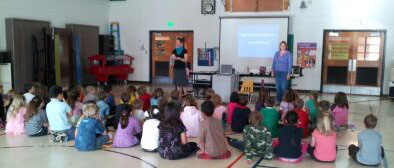
On May 9th and 10th, 2012, Idaho Black Bear Rehab, Inc. (IBBR) was invited to present to over 470 elementary school children in the Wood River Valley of Idaho. As a part of Ketchum, Idaho's Environmental Resource Center, the annual Environmental Education Outreach Program. Presenters come from all over the state of Idaho to share information about their work in various environmental and wildlife projects. IBBR focused on information about black bears, our rehab program, and launched our new educational initiative, Be BearWise.
It was the perfect opportunity for the local children to learn about the habitat and needs of the black bears in their area; learn about making a difference in the lives of individual bears and bear populations; and learn how to co-exist peacefully with bears, both at home, and when recreating in black bear habitat.
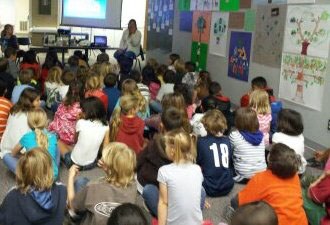
It was quite a "whirlwind" of activity over the two days of presentations, with lots of kids and schools. The videos and pictures we shared were a HUGE HIT with both students and their teachers. We had numerous handouts, information about bears from WSPA's "Bears of the World," information about our rehab program; and tips to Be BearWise, which we hope that the children will share with their community to help resolve any conflict issues that are arising with the local bears.
We were very excited when we found out that the mascot for one of the schools in Bellevue is the bear. We would love to pilot an IBBR project there, which shows support for bears, IBBR, and Be BearWise.
A special thank you goes to Victor Watkins, and Philip Wilson of WSPA, who helped us launch our new Bear Trunk. Many kids and teachers appreciated the fact that the paws and skull examples were replicas and not from "real" bears. We had a great replica example of bear scat too, although, the children might have thought it amusing if that were "real" as we were carrying it around in our hands. We included examples of various books and videos from our library that might be of future interest to both the children and teachers as well.
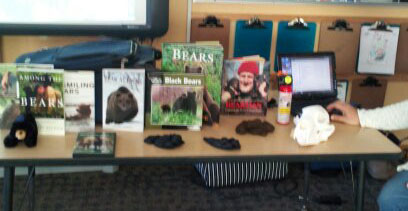
Although many of the communities are small town/semi-urban communities, we also visited Carey, which is very rural, with both ranching and farming as predominant features. Based on the information we received from both the town and rural children, our introduction of our Be BearWise program was an important first step in their area, to introduce information on how to humanely and effectively prevent or resolve conflict with bears that are foraging in human garbage, living in the areas where residents and visitors might camp and hike, and to introduce solutions to help protect crops and small farm animals (chickens) from the activities of bears.
There is a dire need here for our Be BearWise message! The timing of these presentations was perfect. Bears are coming into the residential/town areas of many of these communities, at various times, and it appears that there has been little education with the children (and we didn't see any information for adults) regarding how to co-exist with bears. We'd like to have IBBR be a leader in helping these areas become BearWise. By sharing information with the public (adults and children) and working with the municipal governments, IBBR can encourage these communities to utilize "bear proof" garbage containers, and help to distribute information to residents and visitors about Be BearWise living, camping, and hiking. It also appears that there is a dire need, even though the communities have bear habitat close by, to share general information about bears, their habitat needs, their behaviors, etc.
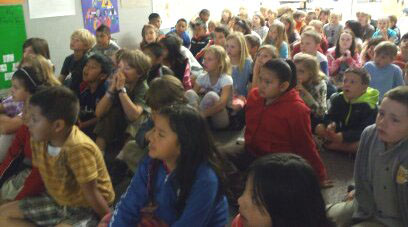
Timing is critical, as to our knowledge these communities aren't yet "angry" with bears...but, if they continue to have problems, without positive solutions, it could turn negative at some point in the future, with the bears getting the short-end of it all, resulting in more orphans, and the communities will still have their "problems."
Human/Bear Conflict Workshop
IBBR was invited to present our Poster on our rehabilitation program at the Human/Bear Conflict Workshop in Missoula, Montana, March 2012. It was a wonderful experience, and we had the opportunity to meet attendees from all over the U.S., Canada, and beyond who are working with wild black bears, polar bears, and grizzlies. So many of the attendees, including MANY from wildlife agencies and park systems are working hard to find a balance between the activities of humans and bears - most are implementing humane and effective solutions to issues that arise during conflicts between humans and bears: bear proof trash containers, ordinances prohibiting the feeding of wildlife (birds and squirrels too), education programs for urban and rural communities, education programs for back country users, and more. Many are concluding that it's the activities of humans which are the leading source of problems, and that must be addressed and changed - the short term solutions, such as bear removal from an area, will not make long term change. We were been pleasantly surprised at the "bear positive" attitudes and policies that were expressed at the workshop! We intend to incorporate a specific "Bear Wise" element into our current education program.
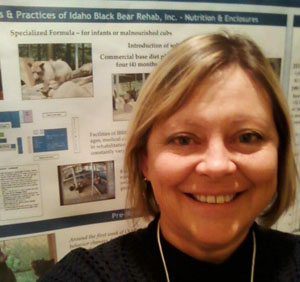
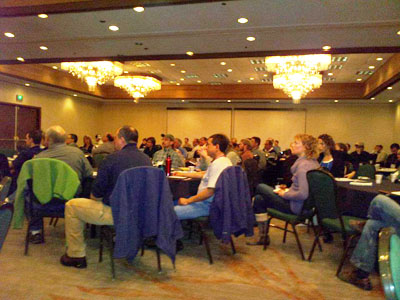
|

